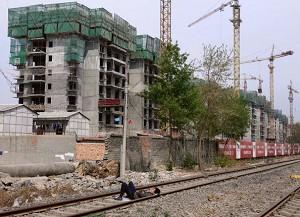The housing prices are skyrocketing in China’s major cities and are beyond the affordability of the general public. A Shenzhen City resident named Zou Tao posted an open letter on the Internet urging people to “boycott high-priced housing,” and was soon echoed by a large number of others. Shortly after, however, the open letter and the related messages on the web site were deleted. Furthermore, the web site has been blocked, and the campaign played down.
Shenzhen City’s housing prices in the first quarter of 2006 rose by 20 percent compared with the same quarter of the previous year. The average housing price amounted to 8,700 Yuan (US$ 1,085) per square meter (about 10 square feet), which is far higher than what average people can afford. Zou Tao, a resident of Shenzhen City, who once recommended himself as a candidate for Shenzhen’s representative of the People’s Congress, launched the campaign to “boycott high-priced housing” on April 26. He called on all citizens to “cast votes with feet and boycott high-priced housing,” while requesting real estate companies to take initiative in lowering housing prices to a reasonable level.
According to the Southern Metropolitan Daily , as of 7 pm the following day there were over 5,000 messages posted in response to the campaign, of which the overwhelming majority was supportive. Among them, over one thousand users left their contact information on the web site. Moreover, many expressed that they would initiate similar campaigns in other cities.
Zou Tao’s open letter was posted on, oeeee.com, a popular web site in Shenzhen. An Epoch Times reporter has been attempting to access oeeee.com and szonline.net since April 28 without success. Following is a conversation between our reporter and a cyber police officer from a phone call made to the network supervisory department of the Shenzhen City Police Bureau.
Reporter: “Did you delete a large number of messages on the oeeee.com? Or did you ask someone to do so?”
Cyber police: “I have no idea.”
Reporter: “Do you mean that you don’t know, or you didn’t do it?”
Cyber police: “I don’t know.”
On April 28, an insider of the case told our reporter that over one thousand messages echoing the open letter had already been deleted, but that Zou Tao would continue to go ahead with his campaign. At present, when entering “Zou Tao” into the Chinese search engine baidu.com, his personal web site as well as articles relating to his “boycott high-priced housing” campaign can still be found. Given that, Ma Xiaoming, an independent opinion figure in Xi'an City said:
“It is natural for the general public to initiate this kind of protest. Although it may have an impact on public opinion and spirit, the boycott is unlikely to really change real estate speculators’ rigid mindset or their habits of colluding government officials to speculate in real estate market. However, if the government does not pay attention to this matter, it is very likely that the problem with real estate will lead to an even greater disturbance in society.”
To curb housing prices, Beijing has initiated the overall control of real estate in 2005. In spite of this, housing prices have recently soared. In the meantime, the rate of vacant real estate remains quite high. According to Chinese media, as of last March, the total area of vacant houses reached 123 million square meters. The result is a large amount of vacant housing units, with many people still unable to afford a place to live. This phenomenon indicates the severity of the manipulation of housing prices. With regards to this, Professor Hu Xingdou at the Beijing Institute of Technology said:
“I believe that the hike in housing prices is inevitable, as the price mainly depends on the relationship of supply and demand. But, of course, the skyrocketing housing prices have much to do with various management problems. In other words, about one third of housing price is in fact for the payment of taxes and fees. If the taxes and fees can be slashed, housing prices will certainly drop. However, some local governments are highly reliant on proceeds from selling public land and collection of various taxes and fees.
Certainly, some problems in the real estate sector are also a result of unscrupulous businessmen colluding with government officials. In terms of running real estate business in China; since land is mainly purchased from the government and can be mortgaged to banks for loans, real estate business often doesn’t need much money poured into it. In other words, nearly 70 percent of capital in the real estate industry is borrowed from banks. But how is it that businesspeople get loans from banks? And how can they purchase land from the government? In these regards, I would say it is because power has outweighed market economy in China.”


